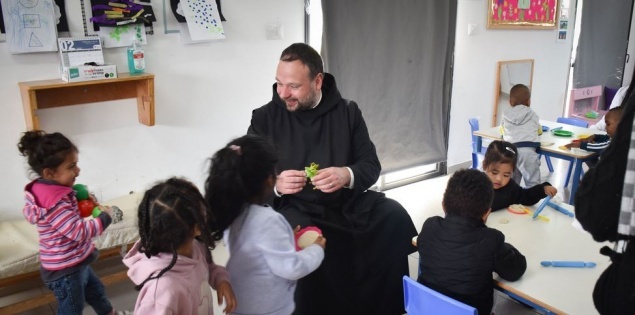TEL AVIV – Despite their difficult situations and the many problems, both social and economic, that they face, the different communities that the Vicariate for Migrants and Asylum Seekers brings together contribute enormously to the Church in the Holy Land, not only through their joy of living but also through the deep humanity of their members.
In 2011, in order to serve the community of Catholic migrants and asylum seekers in the Holy Land, the Latin Patriarchate of Jerusalem founded the Coordination for the Pastoral Among Migrants (CPAM), which, in 2018, under Mgr Pierbattista Pizzaballa (in this time Apostolic Administrator of the Latin Patriarchate), became the Vicariate for Migrants and Asylum Seekers (VMAS). Under the responsibility of Fr. Nikodemus Schnabel, O.S.B., Patriarchal Vicar and member of the Benedictine community of Dormition Abbey, this Vicariate today gathers communities from the Philippines, Sri Lanka, India, Eritrea, Ethiopia and other parts of Africa (French and English speaking), as well as Ukraine, Russia, Romania and China.
For economic reasons, most of these people live in Tel Aviv, as job opportunities and humanitarian NGOs are numerous in the area. Beside the churches in Jaffa, the main church for the Migrant Communities is Our Lady Woman of Valor, located in the south of Tel Aviv. It is the only church owned by the Vicariate, and it was built thanks not only to the generous contributions of external donors, notably the Order of the Knights of the Holy Sepulchre, but also thanks to the determination and faith of the communities living there. Now, there is also a chapel, several pastoral and daycare centers (including one in Jerusalem) and two lodgings for the sisters serving the communities, respectively of Filipino and Sri Lankan origin (of the Perpetual Help and Saint Paul de Chartres congregations). Every weekend, thirteen Eucharistic celebrations take place inside Our Lady Woman of Valor.
Most of the problems encountered by these populations are legal or economic. The cost of living, especially in Tel Aviv, is a real concern. “The vast majority of the Vicariate’s expenses are for rent,” explains Fr. Nikodemus. “We rent most of our daycare centers, as well as the rooms reserved for youth activities. Renewing the contracts takes time and eats up most of our budget, when we would need much more space to accommodate all our communities.”
Another challenge is having access to medical care and basic services, especially for families. Although insurances do cover some significant costs, a part remains that must be paid by the families themselves – many of which are single mothers. A lot of people also live with the threat of expulsion constantly weighting on their shoulders, as the procedures to obtain or renew visas often take up to several years and can be very costly, especially when lawyers must be hired. And when a decision is finally reached, the visa often happens to be only temporary, which means the same procedures will have to be undertaken again in a year or two.
“I have been working as a nursing assistant for several years,” says Carla*, a Sri Lankan woman who lives in her employer’s apartment and sleeps on a couch next to the latter’s room. “I had to fight to get a visa. My employer was very supportive and helped a lot, but it wasn’t easy and it took a very long time.”
Whereas migrants wish to settle permanently in Israel, asylum seekers are looking for a way to emigrate elsewhere (often in Canada). “Most of them have tragic or traumatic stories,” says Fr. Nikodemus. “Some experienced terrible things before they arrived here, others were victims of human trafficking… But their number is shrinking. Today, I have far fewer asylum seekers than migrants. And unlike the latter, they find a lot of support everywhere, from NGOs to charity centers. Migrants are less cared for, as they came voluntarily to work – mostly as caregivers or construction workers, although we do have some farmers – and so the image they give to people is less tragic, less touching.”
Despite all these daily challenges, the communities of migrants and asylum seekers are not characterized by their tragedies and the challenges they must face, but by their happiness and hopefulness. They celebrate Mass with an energy and an enthusiasm that cannot be found anywhere else; they volunteer to help during the celebrations, they organize numerous pastoral and youth activities, they help each other by communicating and sharing information. During an African French-speaking Mass in Jaffa, celebrated by Fr. Nikodemus and attended both by a Knight and a Dame of the Order of the Holy Sepulchre and a filming team from the French TV channel KTO, the faithful sang, danced and played music in a way that filled the church with a unique joyful atmosphere. Meanwhile, in Tel Aviv, Masses and common prayers were celebrated continuously during the weekend, and attended by many – so many, sometimes, that some of the faithful had to sit outside the church.
“These people are really wonderful,” smiles Fr. Nikodemus. “Truly, I feel like they are closer to God than I am.”
Watch the following video to discover the heart of the Vicariate of Migrants and Asylum Seekers:






